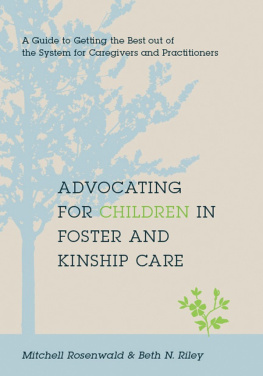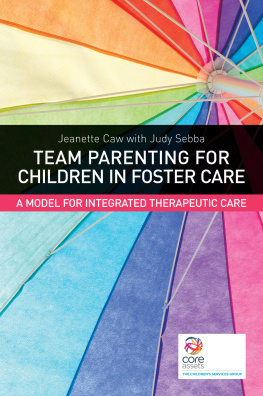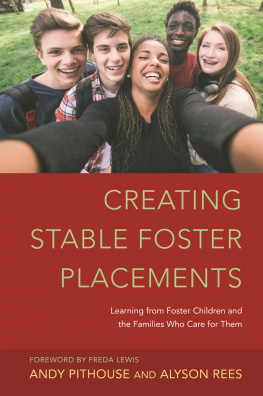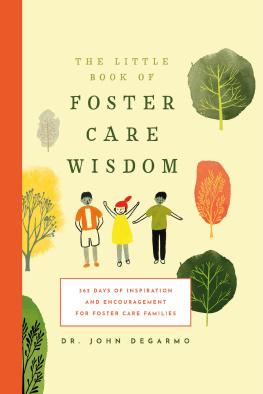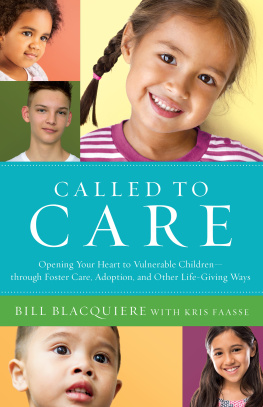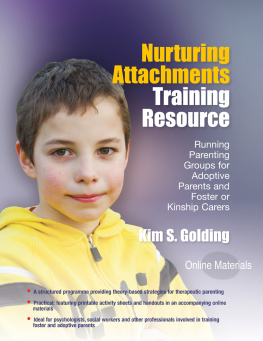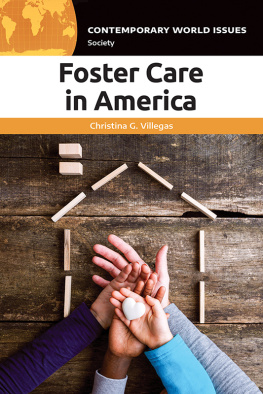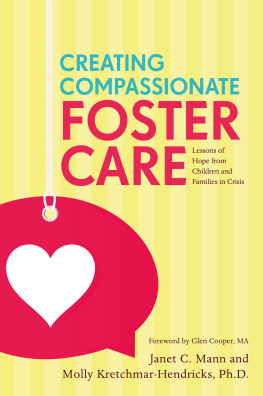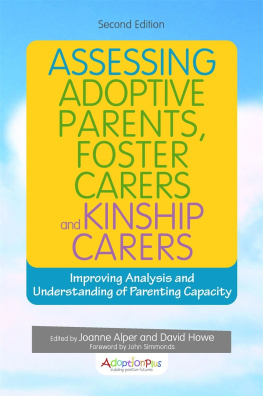Advocating for Children in Foster and Kinship Care
Columbia University Press
Publishers Since 1893
New York Chichester, West Sussex
cup.columbia.edu
Copyright 2010 Columbia University Press
All rights reserved
E-ISBN 978-0-231-51935-9
Library of Congress Cataloging-in-Publication Data
Rosenwald, Mitchell.
Advocating for children in foster and kinship care : a guide to getting the best out of the system for caregivers and practitioners / Mitchell A. Rosenwald, Beth N. Riley.
p. cm.
Includes bibliographical references and index.
ISBN 978-0-231-14686-9 (cloth : alk. paper) ISBN 978-0-231-14687-6 (pbk. : alk. paper) ISBN 978-0-231-51935-9 (ebook)
1. Foster home careUnited States. 2. Foster parentsServices forUnited States. 3. Foster childrenServices forUnited States. 4. Foster childrenLegal status, laws, etc.United States. 5. Child welfareUnited States. I. Riley, Beth N. II. Title.
HV881.R675 2010
362.733dc22 2009026894
A Columbia University Press E-book.
CUP would be pleased to hear about your reading experience with this e-book at .
References to Internet Web sites (URLs) were accurate at the time of writing. Neither the authors nor Columbia University Press is responsible for URLs that may have expired or changed since the manuscript was prepared.
To my parents, who gave me my roots and my wings.MR
To all the families who have taught me so much about advocacy, especially Scott, Shane, Colin, and Ian.BR
After working many years in the field of child welfare, I decided to put my money where my mouth was and to become a foster parent for the child who is now my daughter, Leslie. She and I had known each other for more than five years: I met her when she was nine, when I was a childcare worker in her cottage. At the time I became her foster father, Leslie was fifteen years old, both developmentally and emotionally challenged, and had lived all of her lifesince twelve weeks of agein institutional settings. I thought thenand I am sure nowthat she deserved to live in a family, even a family as imperfect as mine.
I believed back then that I knew child welfare and the systems in which one must operate as a foster parent, but in fact I was totally unprepared for being on the other side of social services. Delivering child welfare services is very different from being the recipient of child welfare services; as a foster parent, even though you are part of the team, you are also in many ways, like the child you care for, a client. Like many foster parents who have familiarity with the child welfare system, I thought I knew all there was to know. But I was wrong. Its very challenging to be the client, to be the one who is visited and not the one who does the visit. It is very difficult to parent a child who spent fifteen years in foster care and who had her own separate life before coming to live with you in your world. It is also at the same time joyful to know that what you are doing in becoming a foster parent will change another persons lifeand it has. Being a foster parent is not always easy or smooth, and advocating for an emotionally and developmentally challenged child is, even for a skilled practitioner, a challenge.
There have been many books written about foster parenting, but I have never read any like this one. As I read this wonderful book, Advocating for Children in Foster and Kinship Care, written by Mitchell A. Rosenwald and Beth N. Riley, I could not help but think, I wish this book had been available when I was a foster parentI could have used some help in advocating for my child and for myself as a foster parent! Co-authors Rosenwald and Riley make a compelling case for why advocacy in child welfare remains such a critical issue for practitioners, policymakers, and foster parents. In ten succinct chapters, separated into three overarching organizing sections, the co-authors discuss a range of issues within the realm of advocacy, from advocacy in the family court and social services systems to advocacy on the level of policy change and legislation. In utilizing case studies and providing clear and realistic questions to guide the child welfare worker or the foster parent (both kinship care providers and nonrelative care providers), this book promises to be a valuable tool for both foster parents and professionals who are engaged in child welfare practice. It offers advice that is grounded in practice wisdom and in empirically based evidence.
All these years as a foster parent laterLeslie, now 41, was adopted by me as an adult when she was 37 (proving that youre never too old for a family) and is working on her associates degree at the Brooklyn Institute of TechnologyI marvel at what a wonderful gift Dr. Rosenwald and Ms. Riley have given to the child welfare profession, to current and to old foster parents like me!
The fact that you are reading this book suggests that you are particularly invested in helping improve the lives of children who have vulnerabilities that they themselves in no way chose to have. Children in foster care (care by adults who are nonrelatives) and kinship care (care by adults who are relatives) need the assistance of professionals and guardians who have competent knowledge and skills, a strong sense of ethics, and a big heart. Because of your current or future primary role in the lives of these children, we would like to point out that advocacy will be a central part of your work in helping these youth who rely on you for their care.
In this book we refer to children in care because we are including children who reside in both foster care and kinship care. Additionally, when we discuss those in foster care particularly, we refer to them as youth in carerather than as foster childrenbecause from a strengths perspective, it is vital for readers to remember that these youth are children first; while they may inhabit a child welfare system at a particular time in their life, this is merely an aspect of their identity and development as children rather than the central focus. To this end, when we crafted these words (contrary to those in the literature), we strove for this orientation. We will also refer to foster parents and kinship care providers collectively, at times, as care providers. Finally, practitioners are those current or future professionals who typically have degrees or a background in social work, human services, or related fields.
Advocacy, as defined in a social work context, can be broadened to apply to everyones work in advancing the cause of youth in care; it is the exclusive and mutual representation of a client(s) or a cause in a forum, attempting to systematically influence decision-making in an unjust or unresponsive system(s) (Schneider and Lester 2001:6468). It is essential for foster parents and kinship care parents as well as for practitioners to focus on influencing decision-making, if they are to become an effective voice for the youth entrusted to their care.
This book is structured on and adapted from a specific model of advocacyRae and Nicholas-Wolosuks action-strategy model. This model is based on six factors: (1) solution-based incrementalism, (2) a bottomsup approach, (3) macro social work practice for direct service workers, (4) savvy workersstrong clients/consumers, (5) social work values and the Code of ethics, and (6) a systematic process (2003:42). In adapting these principles to our book, we place emphasis throughout the text on how the process of advocating for youth in care: (1) can address needs, often one small step at a time; (2) is most often initiated by foster parents and practitioners, who are on the front line of service delivery; (3) considers the larger context in which needs emerge; (4) expects knowledgeable foster parents, kinship care providers, and practitioners on the front line to emphasize the strengths of the youth in their care and collaborate among themselves and with others (including the youth themselves as possible) to address youths needs; (5) resides in an ethical context and includes a respect for diversity, and (6) achieves its ends by following a series of steps (Rae and Nicholas-Wolosuk 2003).

